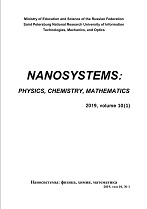|
CHEMISTRY AND MATERIAL SCIENCE
Composite membranes based on geometrically constrained PIM-1 for dehumidification of gas mixtures
E. A. Chernova, I. V. Roslyakov, S. G. Dorofeev, A. V. Lukashin
Lomonosov Moscow State University, Leninskiye Gory, Moscow, 119991, Russia
Abstract:
Composite membranes based on polymer with intrinsic microporosity (PIM-1) confined in the pores of porous anodic alumina (AAO) supports were prepared by spin-coating method under vacuum suction. Water permeance of the membranes was measured at humidities ranging from 10 to 70%. High permeance towards water vapors reaching the value of $\sim$ 13700 l/(m$^2\cdot$bar$\cdot$h) coupled with the H$_2$O/N$_2$ selectivity of 1400 was observed at the humidity of 70% for composite membranes due to the condensation in nanopores of polymer and anodic alumina channels. The obtained selectivity exceeds strongly that of bulk PIM-1 due to confinement of polymer chains mobility in AAO channels. The water vapor sorption capacity for composite membranes exceeds 7% being governed both by condensation in polymer micropores and anodic alumina channels. Physical ageing of the membranes was monitored for a period of 6 months and then the membranes were subjected to activation in methanol. It was established that physical ageing substantially reduces the water permeance but activation in methanol allows one to partially rejuvenate water transport performance.
Keywords:
dehumidification, polymer with intrinsic microporosity, geometric confinement, physical ageing.
Received: 16.05.2019
Revised: 25.05.2019
Citation:
E. A. Chernova, I. V. Roslyakov, S. G. Dorofeev, A. V. Lukashin, “Composite membranes based on geometrically constrained PIM-1 for dehumidification of gas mixtures”, Nanosystems: Physics, Chemistry, Mathematics, 10:3 (2019), 282–288
Linking options:
https://www.mathnet.ru/eng/nano441 https://www.mathnet.ru/eng/nano/v10/i3/p282
|

|




 Contact us:
Contact us: Terms of Use
Terms of Use
 Registration to the website
Registration to the website Logotypes
Logotypes








 Citation in format
Citation in format 